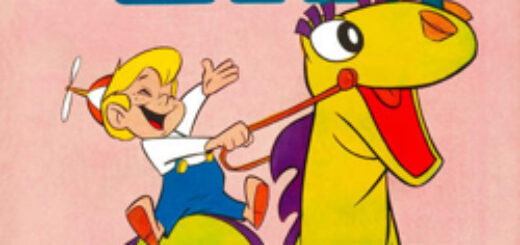Dennis O’Neil: “Dell Comics Are Good Comics”
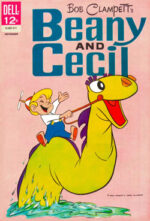 O bitterness! O shame! I devoted a lot of bandwidth last recently to blathering about Howdy Doody, a marionette who had his own, pioneering, television show, a kiddie show back when I was, in fact, a kiddie. Nothing wrong with that. No bitterness, no shame.
O bitterness! O shame! I devoted a lot of bandwidth last recently to blathering about Howdy Doody, a marionette who had his own, pioneering, television show, a kiddie show back when I was, in fact, a kiddie. Nothing wrong with that. No bitterness, no shame.
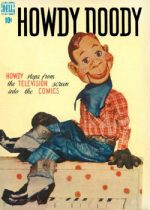 But… This bandwidth-waster is part of an enterprise devoted to comic books and I neglected to mention that our little bestringed buddy had his own comic book. It was published by Dell, which seemed to like puppets since it also had Beany and Cecil Comics, Rootie Kazootie Comics, and Charlie McCarthy Comics. (Okay, Charlie was a ventriloquist dummy, but isn’t that a kind of puppet?)
But… This bandwidth-waster is part of an enterprise devoted to comic books and I neglected to mention that our little bestringed buddy had his own comic book. It was published by Dell, which seemed to like puppets since it also had Beany and Cecil Comics, Rootie Kazootie Comics, and Charlie McCarthy Comics. (Okay, Charlie was a ventriloquist dummy, but isn’t that a kind of puppet?)
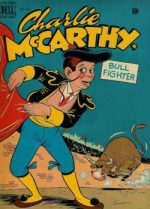 Before I knew much about the business that put food on my table for about a half-century, I was even less aware of Dell than I am now. Actually, I’m not sure I knew what a publisher was, but there were these comics that didn’t feature Superman or Batman or any of the other costumed heroes that gave pleasure to warm afternoons when I didn’t have to endure the leaden misery of school. During those vacation days I read comic books and it is likely that I read some Dells, probably the ones about funny animals, the same funny animals that I sometimes saw at the picture show before the cowboy movie of the week began entertaining me. I doubt that I read any that featured Howdy, Beany, et.al. because I was getting interested in puppets and ventriloquism and wouldn’t I have remembered comics that combined my enthusiasms? Well, maybe not.
Before I knew much about the business that put food on my table for about a half-century, I was even less aware of Dell than I am now. Actually, I’m not sure I knew what a publisher was, but there were these comics that didn’t feature Superman or Batman or any of the other costumed heroes that gave pleasure to warm afternoons when I didn’t have to endure the leaden misery of school. During those vacation days I read comic books and it is likely that I read some Dells, probably the ones about funny animals, the same funny animals that I sometimes saw at the picture show before the cowboy movie of the week began entertaining me. I doubt that I read any that featured Howdy, Beany, et.al. because I was getting interested in puppets and ventriloquism and wouldn’t I have remembered comics that combined my enthusiasms? Well, maybe not.
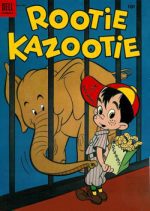 But about these Dells… they were different. And I wasn’t sure why then and I’m not sure why now, though if I actually examined one I might detect what give them their specialness. (I mean, I must have learned something all those years that I sat behind editorial desks.)
But about these Dells… they were different. And I wasn’t sure why then and I’m not sure why now, though if I actually examined one I might detect what give them their specialness. (I mean, I must have learned something all those years that I sat behind editorial desks.)
Later, after the witch hunting 50s, Dell’s titles seemed somehow above the fray, and in a way they were. Instead of sobbing mea culpa and joining the comics Code Authority like most of the other publishers that survived the persecutions – there weren’t many – Dell chose to ignore the censors. “Dell comics are good comics” the company’s slogan reminded its readers. This genteel rebellion had no effect, apparently, on sales. Dell continued to publish for years.
There is probably a lesson to be learned in all this, somewhere, but I’ll let you ferret it out. Whatever it might be, it probably has nothing to do with puppets, the ostensible subject of the current effort, and maybe nothing to do with bitterness and shame, but that might bear further investigation.
Why do people want to engage in censorship, anyway?

